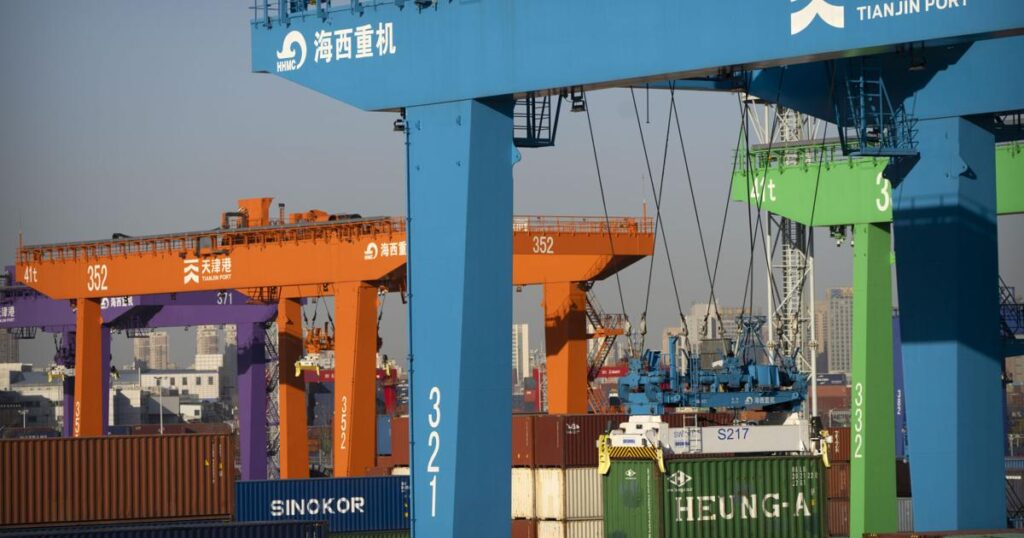Paul Wiseman Associated Press Economics Writer
WASHINGTON (AP) – After showing remarkable resilience this year, the global economy is expected to weaken next year under the strain of war, persistently high inflation and persistently high interest rates.
The Paris-based Organization for Economic Co-operation and Development estimated on Wednesday that international growth will slow to 2.7% in 2024 from an expected 2.9% pace this year. This would be the lowest calendar year growth rate since 2020, when the pandemic began.
OECD Secretary-General Matthias Cormann told a news conference that despite the bleak outlook, the organization “forecasts that recession will be avoided almost everywhere.”
But he added there was a risk that inflation would remain high, as well as the Israel-Hamas conflict and Russia's war in Ukraine, which could impact prices for primary goods such as oil and grain.
Others are also reading…
The main reason for the slowdown is that the OECD expects the world's two largest economies, the United States and China, to slow down next year. The U.S. economy is expected to grow by just 1.5% in 2024, down from 2.4% in 2023, as the Federal Reserve's interest rate hikes (11 of them since March 2022) continue to suppress growth. There is.
The Fed's rate hikes have made borrowing much more costly for consumers and businesses, in the process slowing inflation from its 40-year peak in 2022. The OECD expects U.S. inflation to fall to 2.8% in 2024 from 3.9% this year. By 2025, it will be 2.2%, slightly above the Fed's target level of 2%.
For now, the U.S. economy looks strong. The Commerce Department reported Wednesday that U.S. economic growth rose at a faster annual rate of 5.2% from July to September, supported by strong consumer spending and increased private investment.
China's economy, plagued by a devastating real estate crisis, rising unemployment and slowing exports, is expected to grow by 4.7% in 2024, revised down from 5.2% this year. The OECD said China's “consumption growth is likely to remain subdued due to increased precautionary savings, a bleak outlook for job creation, and heightened uncertainty.”
The 20 European Union member states that share the euro currency are also likely to contribute to the global economic slowdown. They have been hurt by rising interest rates and soaring energy prices following Russia's invasion of Ukraine.
The OECD expects eurozone-wide growth to be 0.9% next year, weak but better than the 0.6% growth expected in 2023.
“The key takeaway today is that the US 2024 outlook has been revised upwards and the outlook for Europe has weakened,” Claire Lombardelli, the OECD's chief economist, told reporters.
He pointed to the impact on Europe of soaring energy prices after Russia cut off much of the continent's natural gas last year. This has raised costs for households and businesses, sparking a cost-of-living crisis and hurting factories in Germany and elsewhere.
The global economy has endured one shock after another since the beginning of 2020. The coronavirus outbreak, the resurgence of inflation as the recovery from the pandemic turned out to be unexpectedly strong, the war in Ukraine, and painfully high borrowing rates as central banks acted aggressively to combat it. is. Acceleration of consumer prices.
But through it all, economic expansion has proven unexpectedly robust. A year ago, the OECD predicted global growth of 2.2% in 2023, but that forecast turned out to be too pessimistic. Now, the organization is warning that the hiatus may be over.
“Growth so far in 2023 has been stronger than expected,” the OECD said in a 221-page report, adding, “However, the impact of tight financial conditions, weak trade growth and weakening business and consumer confidence remains.” “It's felt more and more, and now it's slowing down.”
Additionally, the OECD warned that the global economy faces new risks from rising geopolitical tensions during the Israel-Hamas war, “particularly if the conflict escalates.”
“This could cause significant disruption to energy markets and major trade routes.”
Business news you need
Get the latest local business news delivered to your inbox for free every week.



